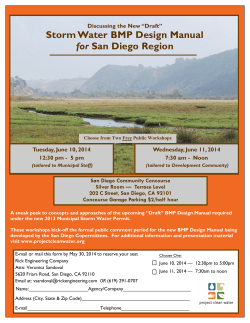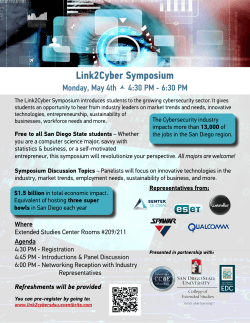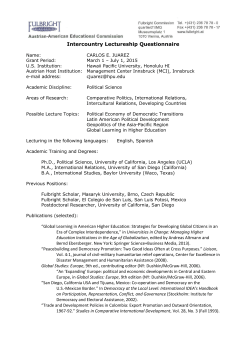
SDNAEP Fact Sheet - San Diego North Adult Education
Who is San Diego North Adult Education Partnership (SDNAEP)? The San Diego North Adult Education Partnership (SDNAEP) is one of five participating consortia in San Diego County. It is made up of the Palomar Community College District and the adult schools that operate within its boundaries (Fallbrook Union High School District, Vista Unified School District, Borrego Springs Unified School District, Escondido Union High School District, Poway Unified School District, Valley Center-Pauma Unified School District, and Palomar College). The Partnership consists of four Program Area Councils (PACs), charged with determining the gaps in specific adult education program areas and drafting plans for improvement. Each PAC is facilitated by a member of the SDNAEP Leadership Council, and includes teachers who have specific experience in the respective program area. Currently, the members of the Leadership Council are as follows: Dom Gagliardi (Escondido Adult School), Olivia Leschick (Valley Center), Liz O’Shea-West (Vista Adult School), Wilma Owens (Palomar College), Shayla Sivert (Palomar College), Mollie Smith (Palomar College), and Kathleen Porter (Poway Adult School). What is Assembly Bill 86 (AB86)? The 2013-2014 State Budget appropriated $25 million to the California Community College Chancellor’s Office (CCCCO) to review and restructure adult education. Through Assembly Bill 86, these funds have been allocated to 70 Adult Education Regional Consortia to write planning grants. These planning grants are intended to develop common policies; to cultivate plans to leverage resources and increase collaboration and partnerships among providers of adult education; to address identified and unmet needs; and to facilitate advancement and career pathways for participants of adult education programs. It is anticipated that the plans and a new funding structure for adult education will be implemented for the 2015-2016 fiscal year. The plans focus on unmet needs in adult education, primarily in five key areas: Elementary and secondary basic skills, including classes required for a high school diploma or high school equivalency certificate Education programs for adults with disabilities Classes and courses for immigrants eligible for education services in citizenship and English as a second language and workforce preparation classes in basic skills, Short-term career technical education programs with high employment potential Programs for apprentices It is anticipated that the plans and a new funding structure for adult education will be implemented for the 2015-2016 fiscal year. What areas does adult education cover? 1. Adult literacy/high school diploma 2. English as a second language (ESL) 3. Adults with disabilities 4. Career technical education (CTE) and apprenticeships
© Copyright 2025









